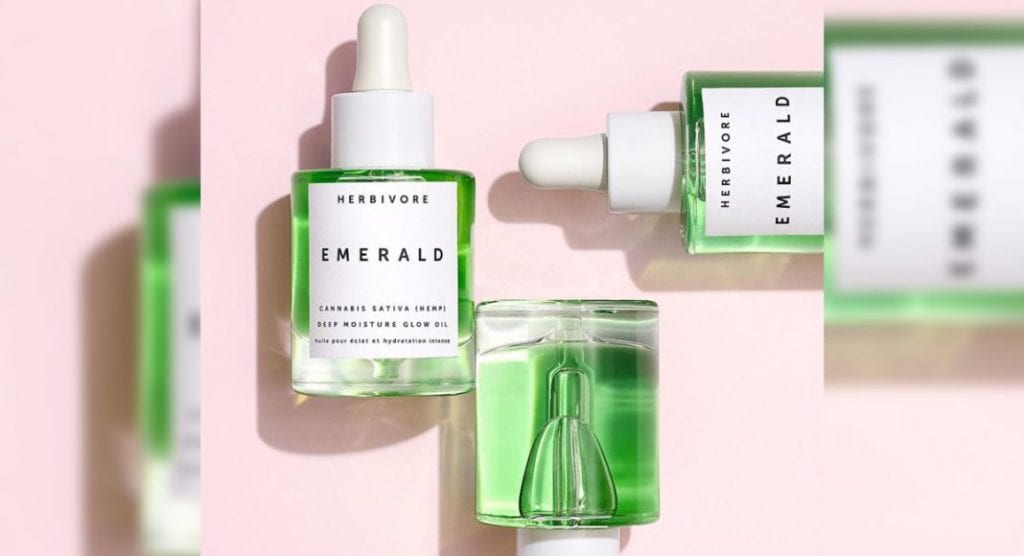CBD is “everywhere, and everyone wants in on it,” the Washington Post asserted of the until-very-recently little-known chemical compound that is often tied to marijuana. “Countless lotions, creams, and salves infused with CBD have launched this year,” Allure asserted in April, pointing to assertions from medical professionals that CBD is a “powerful antioxidant and anti-inflammatory” when applied topically. Companies ranging from startups – like Herbivore and Saint Jane – to established names, such as Kiehl’s and Malin + Goetz, have helped mainstream the burgeoning market for CBD products.
Cosmetics companies are not the only ones that have flooded the market with CBD-infused products; food, dietary supplements, pet food, and other animal health products are also in the mix, creating an industry with sales that are expected to top $5 billion in 2019 – a 700% increase from 2018 – and reach $24 billion in sales by 2023. Many of these products are being touted as providing health benefits thanks to their “miracle chemical compound,” and because CBD products are largely unregulated, such unfettered marketing has – for the most part – been viewed as legally in the clear.
Yet, the legality of products and the marketing of products containing Cannabidiol – or “CBD” – which is an active ingredient in cannabis but without the active high-inducing chemical, is in limbo. Despite the sheer influx of products – like CBD + Adaptogens Deep Moisture Glow Oils, hemp seed-packed Luxury Beauty Serums, “Happy Herb” lip glosses, and Cannabis Sativa Seed Oil Herbal Concentrates – with their varying levels of CBD, are not necessarily within the bounds of the law.
According to Patterson Belknap’s Camille Fletcher and Joshua Kipnees, “For decades, cannabis and its derivatives were identified as Schedule I controlled substances.” In fact, before 2018, while “some CBD products were sold on the market, given CBD’s murky legal status, their distribution was limited.” Target, for example, briefly offered up CBD oil for sale on its website in 2017, only to pull it from shelves shortly thereafter.
The legal status of CBD changed – to some extent – late last year. With the passage of the Agriculture Improvement Act of 2018 – or the Farm Act of 2018, as it has been coined – Congress legalized the cultivation and distribution of hemp. By removing low-THC-level cannabis from the list of controlled substances, the bill – which was signed into law in December 2018 – has “paved the way for CBD with only trace amounts of THC to be sold commercially,” and with it has come a boom in consumer goods products that is likely to expand even further.
But the Farm Act has not been as much a game-changer than initially meets the eye because while it legalized hemp, “the legal status of hemp-derived CBD remains in limbo,” the Post’s Laura Reiley stated in June. “This is largely because CBD can be derived from hemp or cannabis. If a hemp plant contains more than 0.3 percent THC, it is then technically a ‘marijuana’ plant,” and products whose key ingredients are derived from such a plant are not subject to such legalization.
The distinctions are “confusing” to say the least, according to Reiley, who notes that “experts say drafting and implementing regulations could take years.”
Until then, CBD’s regulation comes – most practically – under the purview of the U.S. Food and Drug Administration (“FDA”), which has been paying attention. Over the past several years, the FDA has issued letters to manufacturers of CBD products to put them on notice about making false or misleading claims about their products, including using specific language that might suggest FDA approval.
And the government agency is expected to go further. In July, Amy Abernathy, the Principal Deputy Commissioner of the FDA, announced that the FDA will expedite the development of regulations specific to CBD, with the issuance of a progress report expected to come this fall. The agency stated that it intends to take its “rigorous, science-based approach” and apply it to products containing cannabis or cannabis-derived compounds, such as CBD since “there are many unanswered questions about the science, safety, and quality of many of these products.”
While the Senate’s Agriculture Committee, which drafted and passed the Farm Act, and FDA, alike, wrangle with such developments, an array of states are taking matters into their own hands. For instance, as Burns & Levinson LLP’s Lauren Medeiros Forster note, “Some states, like Massachusetts and New York, have attempted to provide some clarity by taking a stance against the sale of CBD-infused products in response to the FDA’s warning letters.” Many states, however, “have struggled to find the appropriate balance between consumer protection and freedom to advertise a booming hemp-derived CBD market without federal guidance on the regulation of products containing CBD.”
With such a lack of uniform rules in mind, some of the “most controversial areas in advertising” at the moment are those surrounding the advertising of CBD products, per Fletcher and Kipnees.
“Though the CBD industry has good reason to be excited about its sales figures and growth potential,” with Canadian pot company Cronos’ recently-announced acquisition of beauty brand Lord Jones for $300 million, just the latest in what is to come, “it should also be attuned to the considerable litigation risks associated with marketing such products,” they note. To date, growth in this arena has largely outpaced efforts to regulate it, but “the pendulum has begun to swing in the other direction, and with the FDA honing its focus on CBD products, manufacturers of CBD products” need to be aware.
After all, as we speak, a handful of well-known CBD oil companies are facing Racketeer Influenced and Corrupt Organizations Act, Deceptive Business Practices/False Advertising, Fraudulent Inducement, and Breach of Express Warranty charges, among others, in a New York federal court in connection with their alleged misrepresentation of the contents of their CBD “wellness” products.














